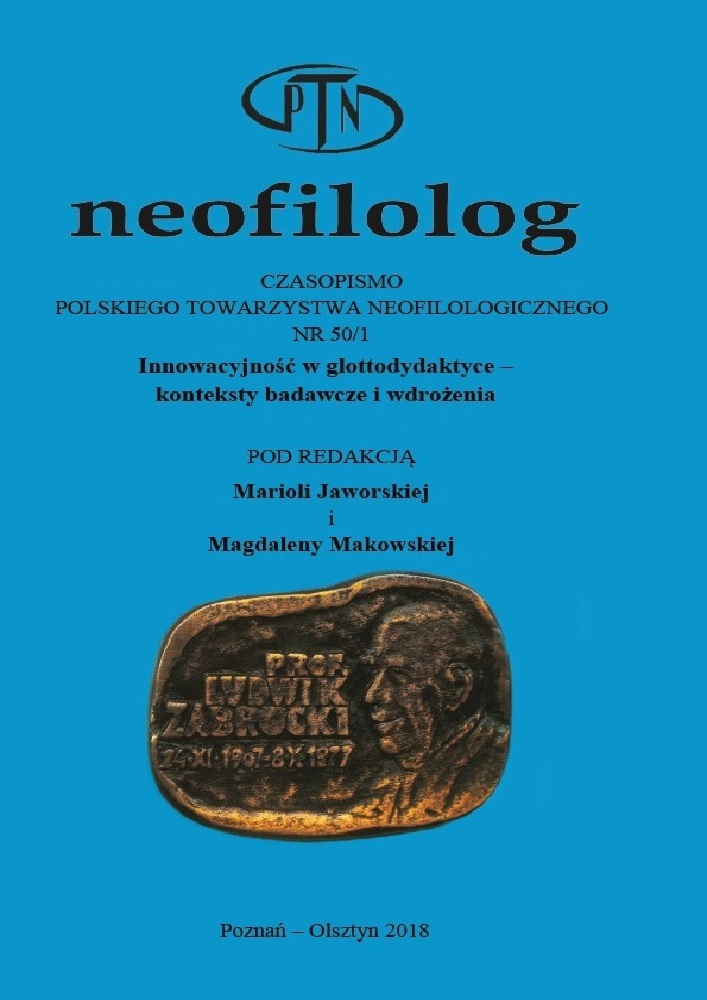Abstract
The aim of this article is to present what the intuition is that occurs during communicative practice and gives us the immediate answer to different doubts and the immediate understanding of language structures without conscious reasoning and loading of the cognitive system. In the first part, we analyze different concepts of language intuition presented in lingusitic and foreign language acquisition. In the second part, a comparative analysis of automatic, controlled and intuitive processes is provided. We show that the distinction between operations that are automatic and those that are under control is a simplification and reduces the issue of foreign language acquisition. In the same part, we also argue for the use of intuition and suggest some indications favorable to implementation of this mental disposition.
Literaturhinweise
Bajrić S. (2005), Question d’intuition (w) „Langue française. La langue française au prisme de la psychomécanique du langage. Héritages, hypothèse et controverses”, nr 147, s. 7-18. Online: http://www.persee.fr/doc/lfr_0023-8368_2005_num_147_1_6860 [DW 30.10.2017].
Blachowska-Szmigiel M. (2008), Schematy umysłowe a rozwijanie twórczych wypowiedzi opisowo-narracyjnych na zajęciach z języka obcego (w) Jodłowiec M. (red.), Nowe perspektywy nauczania języków obcych. Seria „Język a komunikacja” 20. Kraków: Tertium, s. 17-24.
Cuq J.-P. (red.) (2003), Dictionnaire de didactique du français langue étrangère et seconde. Paris: Cle International.
Dakowska M. (2001), Psycholingwistyczne podstawy dydaktyki języków obcych. Warszawa: Wydawnictwo Naukowe PWN.
Europejski system opisu kształcenia językowego: nauczanie, uczenie się, ocenianie (2003). Warszawa: Wydawnictwa CODN.
Degalowitz N.S., Favreau M. (1983), Automatic and controlled processes in the firsthand second-language reading affluent bilinguals (w) „Memory & Cognition”, nr 11(6), s. 565-574.
Kahneman D. (2011),Pułapki myślenia. O myśleniu szybkim i wolnym, tłum. P. Szymczak, Poznań: Media Rodzina.
Lewandowska-Tomaszczyk B. (2010), Introspekcja i intuicja w uczeniu się kategorii językowych (w) Nijakowska J. (red.), Interdyscyplinarne studia nad świadomością i przetwarzaniem językowym. Kraków: Tertium, s. 41-74.
Levelt W.J.M. (1978), Skill theory and language teaching (w) „Studies in Second Language Acquisition”, nr 1, s. 53-68.
Łukaszewski W. (2017), Umysł (w) „Charaktery”, nr 6, s. 3.
Maruszewski T. (2001), Psychologia poznania. Sposoby poznania i rozumienia siebie i świata. Gdańsk: Gdańskie Wydawnictwo Psychologiczne.
McLeod B., Laughlin B. (1986), Restructuring or automaticity? (w) „Language Learning”, nr 36, s. 109-123.
Motycka A. (2005), Rozum i intuicja w nauce. Zbiór rozpraw i szkiców filozoficznych. Warszawa: Eneteia.
Nęcka E. (2001), Psychologia twórczości. Gdańsk: Gdańskie Wydawnictwo Psychologiczne.
Niżegorodcew A. (2007), Uwaga w procesie nauki języka obcego (w) Majer J., Nijakowska J. (red.), Język – poznanie – zachowanie. Studia nad psycholingwistycznymi aspektami przyswajania języka. Łódź: Wydawnictwo Naukowe Uniwersytetu Łódzkiego, s. 52-67.
Nosal Cz. (2007), Psychologia poznania naukowego-umysły i problemy (w) „Nauka”, nr 2, s. 57-76.
Nosal Cz. (2008), Inteligencja i intuicja. Komplementarność w strukturze zdolności umysłowych (w) Brzeziński J., Cierpiałkowska L. (red.), Zdrowie i choroba: problemy teorii, diagnozy i praktyki. Sopot, Gdańsk: Gdańskie Wydawnictwo Psychologiczne, s. 439-455.
Polański K. (red.) (2003), Encyklopedia językoznawstwa ogólnego. Wrocław: Ossolineum.
Shiffrin R.M., Schneider W. (1977), Controlled and automatic human information processing: II Perceptaual learning, automatic attending, and a general theory (w) „Psychology Review”, nr 84, s. 127-190.
Sharwood-Smidt M. (1991), Speaking to Many Minds: On the Relevance of Different Types of Language Information for the L2 Learner (w) „Second Language Research”, nr 7, s. 118-132.
Stróżewski W. (1994), Istnienie i sens. Kraków: Znak.
Wilczyńska W. (2014), Myślenie automatyczne a myślenie refleksyjne, czyli o podejmowaniu
decyzji językowych w J2 (w) Baran- Łucarz M. (red.), Refleksja w uczeniu się języków obcych. Wrocław: Wydawnictwo Uniwersytetu Wrocławskiego, s. 173-190.
Lizenz
Copyright (c) 2018 Wioletta Piegzik

Dieses Werk steht unter der Lizenz Creative Commons Namensnennung - Keine Bearbeitungen 4.0 International.
Autoren:
Die Autoren der zur Veröffentlichung in der Zeitschrift Neofilolog angenommenen Texte sind verpflichtet, den Vertrag über die Erteilung einer kostenlosen Lizenz für die Werke mit der Verpflichtung zur Erteilung einer Sublizenz CC auszufüllen, zu unterzeichnen und an die Adresse der Redaktion zurückzusenden.
Gemäß Vertrag erteilen die Autoren auf die in der Zeitschrift Neofilolog veröffentlichten Texte der Adam-Mickiewicz-Universität in Poznań eine nicht exklusive und kostenlose Lizenz und erlauben die Verwendung der Sublizenz Creative Commons Attribution-NoDerivatives 4.0 International (CC BY-ND 4.0).
Die Autoren behalten das Recht zur weiteren freien Verfügung über das Werk.
Benutzer:
Interessierte Onlinebenutzer dürfen die seit 2017 veröffentlichten Werke unter folgenden Bedingungen nutzen:
- Anerkennung der Urheberschaft - die Verpflichtung, zusammen mit dem verbreiteten Werk Informationen über die Urheberschaft, den Titel, die Quelle (Links zum Originalwerk, DOI) und die Lizenz selbst bereitzustellen;
- ohne Schaffung abgeleiteter Werke - das Werk muss in seiner ursprünglichen Form erhalten bleiben, ohne Zustimmung des Autors dürfen keine Studien, beispielsweise Übersetzungen, verbreitet werden.
Die Urheberrechte aller veröffentlichen Texte sind vorbehalten.
Sonstige:
Die Adam-Mickiewicz-Universität in Poznań behält das Recht auf die Zeitschrift als Gesamtheit (Layout, Grafik, Titel, Umschlagsprojekt, Logo usw.).
